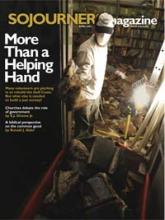On April 4, 1967, Dr. Martin Luther King Jr. gave one of the most important speeches in American history at Riverside Church in New York City. In it he decisively and prophetically extended his public ministry beyond narrowly defined civil rights by calling for an end to the U.S. war in Vietnam. "'A time comes when silence is betrayal,'" preached King. "That time has come for us in relation to Vietnam."
The Riverside speech (variously called "Beyond Vietnam" or "Breaking the Silence") named the sickness eating the American soul as "the giant triplets of racism, extreme materialism, and militarism." It was a watershed moment.
King's address was drafted for him by his friend, historian Vincent G. Harding. King made minor changes, but essentially delivered Harding's original text. "It's important to know that for about as long as the war was going on, Martin was raising questions about it," Harding, a retired professor at the Iliff School of Theology in Denver, said in a recent interview. Harding and his wife, Rosemarie, often attended Ebenezer Baptist Church in Atlanta when King was preaching. "It was clear that Martin was opposing the war," Harding explained, "and that he was opposing it from a deeply Christian perspective."
In smaller venues King had linked the issues of civil rights, economic justice, and peace, but he had never united the three in such a powerful and public way. He had never dissected the history of U.S. military imperialism with such thoroughness. But most strikingly, King launched his deepest, sharpest theological critique of America. No longer was he only holding America accountable to the ideals of her founding documents. Now King was addressing the mechanisms of empire—not just its bitter fruits—and holding America accountable to God.
Read the Full Article
